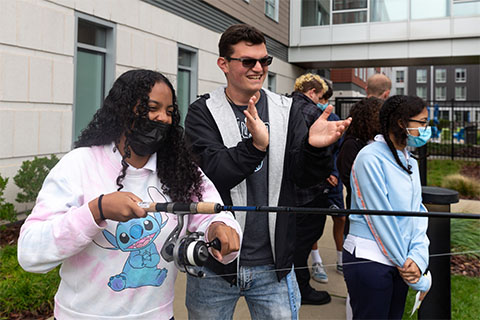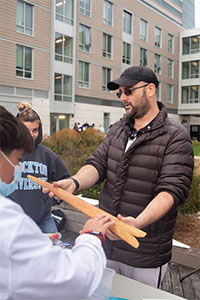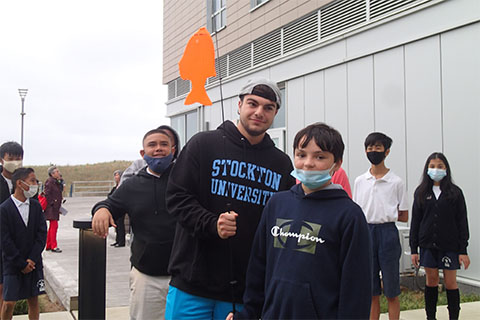New Angles for Success: Mentoring Underrepresented Youth

Assistant Professor of Biology
Here at Stockton University, I teach a variety of biology courses. My favorite would, however, have to be my GNM course, Ecology and Saltwater Fishing. Teaching it now at the Atlantic City campus has provided additional opportunities beyond just that of using the Lake Fred beach to teach students.
In the science of angling, success can be measured in various ways. Most often it is by quality and/or quantity of the species being targeted. But there are many factors that contribute to an angler’s overall success. The obvious range from understanding the winds, tides, moon phases and locations to proper gear. Less obvious factors include an angler’s financial situation, health and time they can invest. All aspects should be examined and improved to truly optimize one’s chances at success.
The same can be said for success in life! Whether life-success is gauged by monetary value, influence or situational contentment, achieving it is more likely with a positive, resource-rich environment. One critical factor here is having role models and mentors early on in life. In research-based literature, it is established that quality mentoring relationships have powerful positive effects on young people in a variety of personal, academic and professional situations.
The American Journal of Community Psychology has many examples demonstrating that mentoring connects a young person to personal growth and development, and social and economic opportunity (Schwartz and Rhodes et al., 2016). Unfortunately, one in three young people will grow up without this critical asset (Bruce and Bridgeland et al., 2014). Low-income areas in particular are considered to have more at-risk youths whose chances for aspiring to attend college would greatly increase with a mentoring program.
 Overcoming Obstacles
Overcoming Obstacles
There’s been an effort by higher education and other institutions to create youth mentoring programs. An example is the program Hooked on Fishing-Not on Drugs (HOFNOD), developed by the Future Fishermen Foundation and sponsored by the New Jersey Department of Environmental Protection (NJDEP), Division of Fish and Wildlife. This program teaches kids fish biology and angling skills, ecology, stewardship, sea-to-table, food security, ecotourism and life skills. This is accomplished in part through its vast resources that include experts in various fields, training facilities, angling gear, associated textbooks, activities, specialized access to relevant sites, and teaching models/tools.
One of many benefits is that young adults who face an opportunity gap but have a mentor are 55% more likely to be enrolled in college than those who did not have a mentor (Mentoring.org).
HOFNOD’s past success and future potential have attracted separate organizations to be the mediators of these youth mentorships. Stockton University is at the forefront of this initiative. Stockton Atlantic City is located in a school district that serves a high-need, highly diverse population of children. In collaboration with both the NJDEP and Atlantic County Sheriff’s Office, Stockton is striving to create bonds between the Atlantic City school children and its own University community. These relationships will foster a positive environment and combat negative feelings that at-risk youth may develop around formal education.
This collaborative project, New Angles for Success, uses Stockton faculty, staff and college students trained in the HOFNOD program to mentor at-risk youths. Various pedagogical techniques such as crossover learning, computational thinking, embodied learning, adaptive teaching, context-based learning and think-pair-share are employed. Ultimately, this will benefit both the college student mentors and their at-risk mentees, strengthening the path to higher education.
There are 10 elementary schools in the Atlantic City School District. The target population consists of selected children in grades 5 and 6 (when research on at-risk children shows that they are forming dispositions toward formal education). Even as each college student and participating faculty member serves as an inspirational role model for a potential future college-seeking elementary school child, those children will be teaching the Stockton community members how much we share in common, and how their own diverse perspectives can help to broaden that of the mentors.
Adding Resources to Their Environment
Local elementary schools near the Stockton campus provide increased opportunities
for collaborative community engagement programs such as HOFNOD. One of the nearest,
The Richmond Avenue School, was among the first whose students participated in prior
New Angles for Success events.
With the waning pandemic, we are relaunching the New Angles for Success program. A fall event was held Oct. 14 on the Boardwalk and beach adjacent to campus. Various stations and demonstrations, given by experts and trainers of the HOFNOD program, helped teach the attending youths and beachgoers aspects of fishing. Activities included knot-tying, proper rod casting, fish filleting and beach reading, among others. Stations and educational hands-on activities about the local marine ecosystem, watersheds, ecological interactions, human impacts and more were also available.
New Angles for Success will also be collaborating with associated Stockton programs. For example, the Science Enrichment Academy at Stockton (SEAS) is a summer program for high school juniors and seniors interested in continuing their education in the sciences. Similar resources, pedagogical techniques, and experienced instructors will be shared amongst these programs in the future.
Such interactions will not only inspire and educate young people, but also provide high school and college students instructional opportunities to teach. It will also help to foster relationships among communities, and the later students to develop professional networks.
Ultimately, projects like this will develop partnerships that create pipelines from K-12 schools in the diverse school districts to institutions of higher education. In our present times, the need for conservational advocates and outdoor enthusiasts is most dire. Fostering youths to appreciate and respect the environment will likely mold future leaders on this front.


